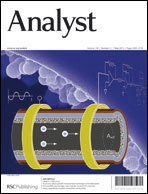Based on a combination of the molecular imprinting technique and polymerized crystalline colloidal array, we have developed an imprinted crystalline colloidal array (ICCA) chemical-sensing material for the real-time and label-free detection of diethylstilbestrol (DES) in aqueous solution. This novel sensing material was prepared by a noncovalent and self-assembly approach using liquid monodispersed DES-imprinted colloidal spheres and was characterized by a three-dimensional (3D) ordered opal structure in which numerous nanocavities were derived from DES imprinting. Thus, the inherent high affinity of the nanocavities allowed ICCA to recognize DES with high specificity, and changes of the ordered periodic structure enabled ICCA to transfer the recognition events into readable optical signals (label-free). Owing to the special opal structure and without interference from the bulk hydrogel film, the ICCA enabled the rapid and sensitive detection of the target analyte. The understanding of the recognizing response has also been advanced by using molecular modeling software to compute rational interaction between the template molecules and the function monomers. After careful optimization of the assay conditions, the ICCA could decrease its diffraction intensity within just 7 min according to the DES concentration from 2 ng mL−1 to 8.192 μg mL−1, whereas there were no obvious diffraction intensity changes for the DES analogues. The adsorption results showed that the homogenous structure and large surface area of ICCA could improve its adsorption capacity. Therefore, such a sensing material with high selectivity, high sensitivity, high stability, and easy operation might offer an attractive alternative for establishing optical sensors for the rapid real-time monitoring of different residues in food and the environment.

You have access to this article
 Please wait while we load your content...
Something went wrong. Try again?
Please wait while we load your content...
Something went wrong. Try again?


 Please wait while we load your content...
Please wait while we load your content...